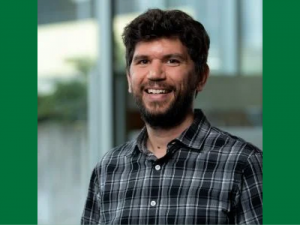
Drew Nobile
Associate Professor of Music Theory
Music
Email: dnobile@uoregon.edu
Phone: 541-346-5651
Office: 206 Frohnmayer Music Bldg
Research Interests: Music Theory, Scholarly Areas
Drew Nobile is a music theorist specializing in the theory and analysis of popular music. He has served on the UO faculty since 2015, where he regularly teaches courses and seminars on popular music analysis, voice in pop songs, tonal form, and linear analysis, as well as courses in the first-year undergraduate theory core. Prior to his appointment at UO, Nobile served on the music faculty at the University of Chicago (2013–15) and Brooklyn College (2010–13).
Nobile’s first book, Form as Harmony in Rock Music, was published in 2020 by Oxford University Press and received the Society for Music Theory’s Emerging Scholar Award, which honors an outstanding music-theoretical book published within 10 years of the author’s PhD. The book offers a comprehensive theory of form for the “classic” rock and pop repertoire of the 1960s, ’70s, and ’80s. Fusing two central music-theoretical research areas—formal studies and popular music studies—the book demonstrates that chord progressions and formal sections sync up in specific ways, producing a small number of conventional patterns used consistently across genres and decades. In so doing, the book advocates for the value of listening to rock music structurally, arguing that a structural mode of hearing reveals essential features of the style that might otherwise remain below the conscious level.
In addition to his book, Nobile has published articles and essays on various popular music topics, the Beatles, Stephen Sondheim, and Arnold Schoenberg in venues including Music Theory Spectrum, the Journal of Music Theory, Music Theory Online, Popular Music, and an edited collection on analyzing musicals from the University of Michigan Press. Beginning in November 2022, he will serve as Associate Editor of Music Theory Online, the most-read music theory journal worldwide.
Nobile is currently at work on his second book project, titled Voicing Form in Rock and Pop, 1991–2020. This project looks at the interactions among lyrics, vocal delivery, and form in popular music of the last 30 years, with case-study chapters on Alanis Morissette, early-2000s indie, and Beyoncé. The central argument is that the so-called “secondary parameters” of timbre and text play a central structural role in this repertoire, thus challenging the notion that sound and structure are fundamentally opposed. Instead, by considering the voice as a primary musical parameter, Nobile expands what counts as musical structure and recasts traditional conceptions of musical value, which may help finally put to rest the tired notion that popular music is musically simplistic. Nobile’s work on this book is being supported by the National Endowment for the Humanities, the Oregon Humanities Center, and a handful of UO grants.
Nobile is a dedicated pedagogue committed to curricular reform in the field of music theory, especially through expanding methodologies and repertoire beyond the traditional canon. In recent years, Nobile has overhauled the first-year theory core to be more inclusive, both in the identities of artists and composers and in the topics covered. In the classroom, Nobile frequently incorporates progressive, research-supported techniques, such as ungrading, universal design, and peer instruction.
- Ph.D. 2014, Music Theory, CUNY Graduate Center
- M.A. 2009, Music Theory, University of Washington
- Sc.B. 2007, Mathematics and Music, Brown University, magna cum laude with honors in music
HONORS
- National Endowment for the Humanities Summer Stipend (2022)
- Society for Music Theory Emerging Scholar Book Award (2021)
- Adam Krims Award, SMT Popular Music Interest Group (2017)
- Oregon Humanities Center Faculty Research Fellowship (2022 & 2016)
- UO Faculty Research Award (2022 & 2017)
- CUNY Barry S. Brook Dissertation Award (2015)
- Dorothy Payne Award, Music Theory Society of the Mid-Atlantic (2012)
- Patricia Carpenter Emerging Scholar Award, Music Theory Society of New York State (2011)
SELECTED WORKS
- Form as Harmony in Rock Music. Oxford University Press, Studies in Music Theory series (2020).
- “Sondheim’s Dissonant Tonality.” In Here for the Hearing: Analyzing the Music in Musical Theater Musicals, ed. Michael Buchler and Gregory Decker. University of Michigan Press. (In press, 2023)
- “Alanis Morissette’s Voices.” Music Theory Online 28/4 (forthcoming, December 2022)
- “Teleology in Verse–Prechorus–Chorus Form, 1965–2020.” Music Theory Online 28/3 (2022)
- “Double-Tonic Complexes in Rock Music.” Music Theory Spectrum 42/2 (2020).
- “Harmonic Function in Rock Music: A Syntactical Approach.” Journal of Music Theory 60/2 (Fall 2016).
- “Counterpoint in Rock Music: Unpacking the ‘Melodic-Harmonic Divorce.’” Music Theory Spectrum 37/2: 189–203 (Fall 2015).
- “Interval Permutations.” Music Theory Online 19/3 (Fall 2013).
- “Form and Voice Leading in Early Beatles Songs.” Music Theory Online 17/3 (Fall 2011).
